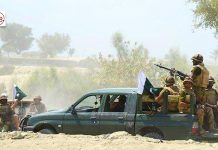If pakistan is not able to provide justice to the Baloch people, it risks repeating the same mistake that subsequently ended in the Fall of Dhaka.
Author: Hayr Bux Baloch
“Mastikhan Saheb, they are arresting you (for participating in a peaceful democratic protest). What message do you want to send to the (Baloch) nation?”, asked a man recording the arrest of the prominent 76 years old veteran Baloch nationalist leader Yousuf Mastikhan. He was sitting in a police car being detained on trumped up charges. “This is what happens in this tyrannical state if you peacefully demand your (basic) rights,” answered the Baloch leader before he raised a victory sign, the show of perseverance and determination in the face of a draconian state.
Mr. Mastikhan was the recent participant of a sit-in protest that started 27 days ago and is still undeterred even as the states high-handedness is increasing day by day. They have called upon the police with riot gears. It seems like the state is provoking these peaceful protesters. As the there is a media blackout, the populace residing in other parts of the country have been kept in a state of ignorance. The consequences of such actions might not be in the best interest of the region or the state itself.
While Pakistani media was playing dirty politics with a media blackout of Balochistan, chants of “long live revolution” and “Struggle against tyranny” reverberated across the coastal city of Gwadar. Although the mainstream media, deliberately or because of external pressure, was not covering the protests, the establishment, with all its might, could not stop the flow of information. Videos poured on social media as the chants of these Baloch women echoed in every corner of the country. It is mind numbing to observe that such a popular uprising is not getting any media coverage even in the so called “progressive media”, let alone the conservative majority of the media houses which have thrived in conspiracy ridden news stories. The participants have since relied solely upon Internet platforms such as Twitter and Facebook. It could be history in the making as many esteemed commentators opined as they were astonished by the scores of women that led as well as participated in the protest.
It is not the first time that the women in Balochistan have led the protests. Baloch women have been leading most of the struggle for justice on the ground as their male counterparts have either been murdered, or were forcefully kidnapped and their whereabouts is unknown. Therefore, the buck has been passed onto those unfortunate mothers and daughters who have led the struggle to get their loved ones out of illegal detention by the state agencies.
Ironically, on the 9th of December, the night before the International Day of Human Rights (10th December) is celebrated across the globe, the Pakistani state and their allies in the form of provincial elites, seem to have refused the people of Gwadar their basic human rights. Not only have they been historically ignored, even their right to protest was being thwarted. In the age of scientific and technological advancements, the people of Gwadar and most of Balochistan are living in such dire conditions that according to recent reports, more than half of the population of Balochistan lives below the poverty line. That number is much higher than the national average in Pakistan which is closer to 16%. While the state backed politicians, Shahzain Bugti for instance, are seen flaunting luxurious, foreign imported, Porsche Taycan 2021 model, the people of Balochistan are struggling to put food on the table. It is then not a surprise that people, with their children on their backs, have been crying for justice in a system that requires injustice to live.
“The Jewel in the Crown” as the term was coined for Gwadar by career politicians in Pakistan as well as in Balochistan implying that Gwadar would be the jewel in the China Pakistan Economic Corridor (CPEC), the region is still living in absolutely destitution. They use firewood to cook as the natural gas which was discovered in Balochistan itself in 1952, almost 70 years ago, was not provided to the people of that same Balochistan. It has been, however, siphoned to eastern provinces to run their industries and increase their economic well-being. Everyone living in Pakistan is a beneficiary of Balochistan. It is imperative for every Pakistani to ask their establishment the question that should have been asked decades ago.
It is important to understand why these protests have erupted in Gwadar. Even though It was Gwadar that brought more than $60 billions in investments from China in the form of CPEC, the people of Gwadar have not received much when it comes to development. It is still not able to “change the fate of the people of Gwadar” as it was repeatedly promised by the state establishment. Many analysts would argue that in the 9 years since the corridor was initiated, people of Balochistan have not kept pace with the level of progress even when other parts of Pakistan have been developing, relatively speaking.
The main sources of income for the people of Gwadar are limited. Unlike other port cities like Karachi, there is no private industry, there is no banking sector, the land of Gwadar is not fertile for it to utilise it for agriculture. The only two options for everyone in Gwadar is either from the border trade or goods from Iran, or the vast blue ocean that has been fished by the locals for more than 2000 years. The fact that the state and its cronies. They have hijacked the only two sources of income for these impoverished families.
The million dollars expensive deep-sea trawlers, that have been banned in many countries around the world for its unethical fishing mechanism, have put the local fisherman at an absolute disadvantage. These mega trawlers have been known to endanger marine. These trawlers that have been fishing in China for several years now, are owned by magnates from China, as it was reported in The Guardian UK about Chinese trawlers, as well as many influential Pakistanis. This has created a serious economic impediment for the people of Gwadar that have already lived under massive destitution.
Moreover, the people of Balochistan have close relationships with the people of the Sestan va Baluchestan, as referred by the locals as Iranian Balochistan. They have families on both sides of the border. Hence, the state that has a knack for beating its most vulnerable people down, have closed the border with Iran. The economic trade of Gwadar, as a consequence, has been severely affected.
With mounting anger and frustration, the people have come out on the streets. They have been sleeping on the roads for almost a month now but to no heed. All their pleas have till now fell upon deaf ears. If pakistan is not able to provide justice to the Baloch people, it risks repeating the same mistake that subsequently ended in the Fall of Dhaka. These people are not on the streets because they are being propped up by “foreign powers”. They are not traitors of the country. They are law abiding citizens that are being pushed to the wall and it’s not a new phenomenon. They have been pushed for 70 years. Now is the time to change or the rage should turn these hitherto peaceful protesters to look for other ways to fight for justice.






























